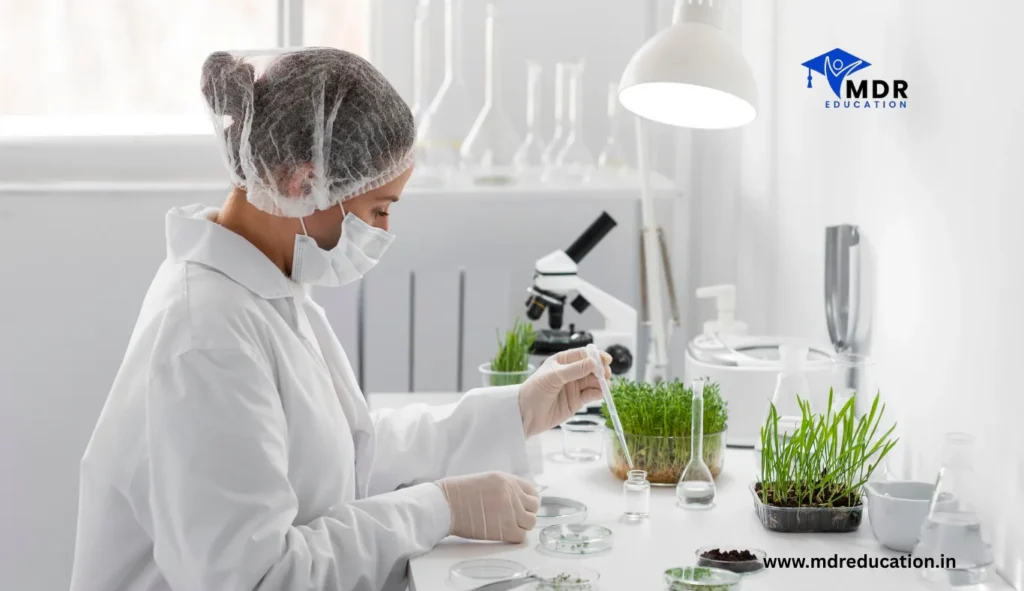Investigate a PhD in Botany to open up lucrative careers in biotech, conservation, and research. Find prospects for 2025, financing, and elite universities.

PhD in Botany Powerful Ways
Introduction
A PhD in botany is a career accelerator that leads to high-paying positions, innovative research, and worldwide influence. It’s not only about studying plants. A PhD in botany can transform your passion into a successful career, whether your goals are to lead conservation initiatives, find new medicinal plants, or create drought-resistant crops.
The catch is that not all PhDs are made equal. The difference between a modest salary and a six-figure income can be determined by your specialization, university of choice, and networking technique.
In this guide, we’ll outline seven effective tactics to optimize your Botany PhD income and impact, as well as how MDR Education may help you get accepted into prestigious programs.
Are you prepared to advance in your career? Visit www.mdreducation.in or give MDR Education a call at 80580 48780.
1. Choose a High-Demand Specialization
Your potential pay is directly impacted by the focus of your PhD. In 2025, the following specialties in botany will be the most lucrative:
- Plant Biotechnology: Developing CRISPR-modified crops or biofuels. Average Salary: 10-18 LPA (India), 90,000-130,000 (USA).
- Ethnobotany: Collaborate with pharmaceutical firms to find novel therapeutic herbs. Example: The cancer-fighting medicine taxol derived from yew plants.
- Climate Change Ecology: Government/NGO financed research. Starting salary in India: ₹8 to 15 LPA.
Advice for Pros: Match your thesis to industry need (e.g., sustainable packaging from algae).
Having trouble choosing a specialty? To find the ideal fit for you, MDR’s professionals examine employment trends!
2. Target Universities with Industry Connections
Research collaborations, internships, and employment placements are provided by top programs. Search for:
- TNAU (India): Closely associated with agriculture (e.g., Mahyco, ITC).
- The Netherlands’ Wageningen: Plant sciences leader worldwide. * Graduates start with a starting salary of €60K+
- UC Davis (USA): Research center for wine and horticulture.
The main advantage is that many universities have job portals just for PhD students.
Having trouble making a shortlist? Admissions are made easier by MDR’s agreements with over 100 universities!
3. Publish in High-Impact Journals
Salary leverage = publications. Aim for:
- Natural Plants ( Factor Of Impact:15.8)
- The Cell of the Plant (IF: 10.7)
- Products and Industrial Crops (IF: 6.0)
Hack: Work on practical research projects with scientists from the industry. For instance, an article about nanofertilizers can draw in agritech companies.
4. Secure Grants & Fellowships
Funding increases credibility and eases financial strain. Best choices:
- Research grants plus DBT-JRF (India): ₹31,000 per month.
- For three years, NSF GRFP (USA): is $34,000 annually.
- Monthly Marie Curie Actions (EU): €4,880 plus travel expenses.
Pro Tip: Talk about how your work tackles global issues, including food security.
5. Build a Public Profile
Influence creates career opportunities. Try:
- Utilize LinkedIn to distribute infographics, such as “How Plant RNA Vaccines Work.”
- Talk about urban farming or plant-based polymers in your TEDx Talk.
- Consulting: Fees range from ₹15,000 to ₹50,000 for each crop study job.
MDR’s Branding Workshop: Develop your ability to sell your knowledge!
6. Network with Agribusiness Leaders
Where to connect:
- Meeting: International Society for Plant Molecular Biology (ISPMB).
- Connect with bayer/syngenta recruiters.
- Alumni Network: 60% of Jobs Not Posted!
Real Story: Through a conference coffee talk, an MDR student was able to secure a job at Biocon for ₹20 LPA.
7. Transition to Industry Post-PhD
Top-Paying Roles:
- Seed companies for plant geneticists cost between 15 and 30 LPA.
- Cannabis Research Lead (Canada’s legal markets: $120,000+).
- UN/World Bank Climate Policy Advisor: ₹18–40 LPA.
Key Competency: Learn R and Python for bioinformatics positions.
Conclusion
If you plan ahead, a PhD in botany is a wise investment. Every step affects your income potential, from selecting the best specialization to securing industry partnerships.
🌱 Your next steps:
📞 Contact MDR Education at 80580 48780
🌐 Visit: www.education.di
